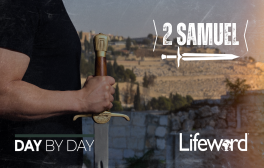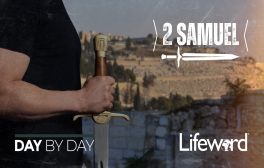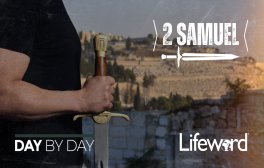(Lifeword)
Scripture
Regardless of our circumstances, we should submit ourselves to God’s will and plan. #daybydaylw Interested in learning more about becoming a devoted follower of Christ? Go to follow.lifeword.org! ~~~ King David in the first stanza in Psalm 3 gave expression to the great crisis we find him in in 2 Samuel 15. His enemies have risen up against him. “O LORD, how many are my foes! How many rise up against me? Many are saying of me, ‘God will not deliver him’” (vv. 1-2). I am not sure we understand how life-shaking a statement like that is, which is coming from thousands of people—“God will not save you!” I have had just one person say to me that I preach a false gospel, and it unnerves you! It keeps you up at night. It upsets you. It makes you question everything. And that was just one person. I can’t imagine what it might do to me if thousands of men are saying that about me. Men I know. Men I have led. Men who were my friends. And now men who say, “God has abandoned him. God will not deliver him. God will not save him.” This is the atmosphere of David’s life at this time. And it is this aspect that makes the passage before us so inspiring…helpful…encouraging…challenging. We catch up with David in 2 Samuel 15: 24, having passed over the Kidron brook, headed toward the wilderness. It wouldn’t be the first time the people of God had been in the wilderness. The wilderness represents times of trial and testing. It is the place of discipline. The wilderness is not pleasant. Nothing comes easy in the wilderness. Survival is day by day. And many of you HAVE BEEN there? Many of you ARE there? OR will SOON be there. Wilderness experiences in our day do not usually include traipsing around the desert all alone with the wild animals. I suppose it could include that, but that is not the normal wilderness. Today’s wilderness experience could be lonesomeness brought on by your sin, relational burdens, physical hardships, emotional struggles, financial uncertainties, spiritual letdowns. And those burdens press hard upon you. Your flesh cries out for some type of relief, and yet we are often times forced to wait…wait…wait upon God. So David is heading out to the wilderness, and he notices that two priests, Zadock and Abiathar, and the Levites had come to the edge of the city with the ark of the covenant. They were expressing their loyalty to David. David had always been loyal to the priests of Israel, and now they wanted to show their loyalty back to him by bringing the ark of God to be with David. It was a visual symbol for all of Israel to see and understand that, in fact, God had not abandoned David. God was on David’s side. These men wanted to honor David, encourage David. Show their support of David. And this is what is so special about David’s words in this scene. He will not use the ark like it was used by Hophni and Phineas, as a token, as a good luck charm. As Dale Ralph Davis wrote, “David is not so much interested in Yahweh’s furniture, as much as he is in Yahweh’s favor.” Appearances will not suffice, only grace or discipline. David submits himself to God’s will and plan, come what may. If it be His grace and favor to bring him back to Jerusalem as the king over Israel, so be it and bless him for it. If it be more discipline or death, so be it and bless him for it.
Other media in this series
(Lifeword)
(Lifeword)
(Lifeword)
(Lifeword)
(Lifeword)
(Lifeword)
(Lifeword)
(Lifeword)
(Lifeword)
(Lifeword)
(Lifeword)
(Lifeword)
(Lifeword)
(Lifeword)
(Lifeword)
(Lifeword)
(Lifeword)
(Lifeword)
(Lifeword)
(Lifeword)
(Lifeword)
(Lifeword)
(Lifeword)
(Lifeword)
(Lifeword)
(Lifeword)
(Lifeword)
(Lifeword)
(Lifeword)
(Lifeword)
(Lifeword)
(Lifeword)
(Lifeword)
(Lifeword)
(Lifeword)
(Lifeword)
(Lifeword)
(Lifeword)
(Lifeword)
(Lifeword)
(Lifeword)
(Lifeword)
(Lifeword)
(Lifeword)
(Lifeword)
(Lifeword)
(Lifeword)
(Lifeword)
(Lifeword)
(Lifeword)




















































